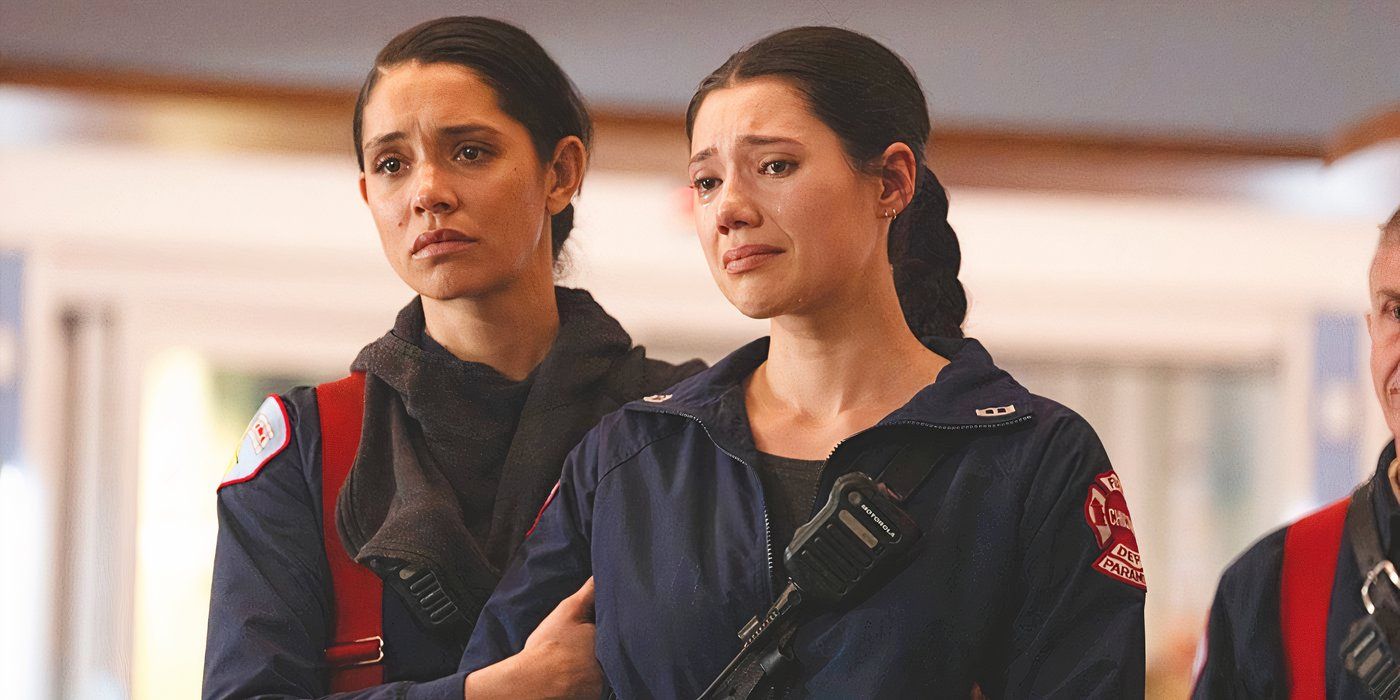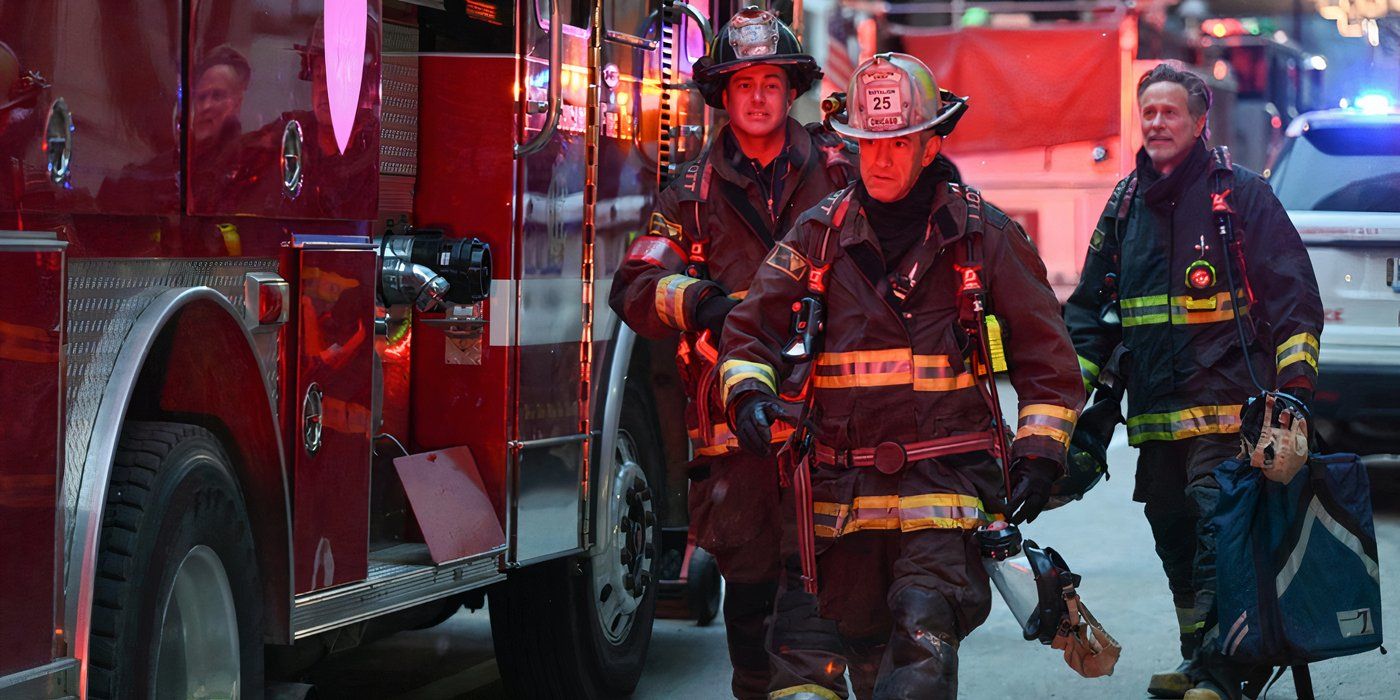
The tragedy that rocked Chicago Fire Season 13, Episode 15—aptly titled “Too Close”—has left both the characters and the audience reeling. The sudden and shocking death of Chief Pascal’s wife, Monica, may not have been as high-profile as losing a firefighter, but it delivered a surprisingly emotional impact—particularly on Violet Mikami, Firehouse 51’s normally composed paramedic-in-charge.
At first glance, Violet’s tearful breakdown at Gaffney Medical after Monica’s passing seems disproportionate. After all, Monica wasn’t a close friend or colleague. She wasn’t a firefighter or recurring part of the show’s inner circle. So why did her death hit Violet so hard? The answer lies not in the moment itself—but in Violet’s past.
As Chicago Fire fans quickly realized, this wasn’t just about losing a patient. It was about Violet reliving one of the most devastating losses of her life—and the show subtly connected the dots in a way that speaks volumes about trauma, grief, and healing.
A Familiar Pain: Violet’s Past Comes Rushing Back
To understand Violet’s reaction, we have to revisit one of the most gut-wrenching episodes in recent Chicago Fire history: the sudden death of Chief Evan Hawkins in Season 10.
Back then, Hawkins—Violet’s love interest—was tragically killed during an on-scene accident while responding to a call. It was a moment that came out of nowhere and left Violet shattered. Though she eventually returned to work and appeared to move on, the emotional scar of Hawkins’ death never truly faded.
Flash forward to Monica Pascal’s death. Violet is the one who desperately tries to keep her alive during transport. She works the call with Novak behind the wheel and Mouch assisting—doing everything right, only to still lose her patient. By the time Chief Pascal arrives, Violet has to deliver the news that no spouse ever wants to hear. But when her voice breaks and her eyes well up, it’s not just about Monica—it’s about the echoes of Evan Hawkins.
Chicago Fire doesn’t always say things outright. But here, the writing was clear in subtext: Violet is reliving the trauma of watching someone die while trying to save them. The weight of past grief, plus the burden of delivering that news again—this time to another grieving partner—made the moment painfully real.

Why Violet’s Breakdown Matters
In a show known for explosive fires, daring rescues, and split-second decisions, it’s easy to forget just how emotionally taxing life at Firehouse 51 really is. Yet, this quiet moment of vulnerability from Violet reminds us of the immense psychological toll the job can take.
Violet’s breakdown isn’t a sign of weakness. It’s a reminder that grief never leaves you—it lingers, even when you think you’ve healed. Monica’s death wasn’t about Violet’s connection to the victim—it was about the situation reopening old wounds.
And that’s exactly what makes this moment resonate so deeply. It wasn’t overplayed. It wasn’t flashy. It was simply one person breaking under the pressure of memories and guilt—emotions paramedics like Violet carry more often than we see onscreen.
A New Emotional Arc for Violet?
As Chicago Fire Season 13 moves toward its finale, Violet’s emotional reaction may be more than just a one-off callback—it could signal the start of a new narrative arc. It’s possible that her grief will resurface in unexpected ways, and viewers may finally get a deeper exploration of her ongoing trauma from losing Hawkins.
And there’s another intriguing development: the potential bond this creates between Violet and Chief Pascal.
Pascal, who has struggled to build relationships with Firehouse 51’s core crew, is now facing his most personal tragedy to date. For perhaps the first time, we see him not as a rival to Herrmann or an outsider trying to fill Boden’s shoes—but as a grieving husband.
This presents a unique opportunity for Violet to be a bridge between Pascal and the team. Unlike most at 51, Violet knows what this pain feels like. She’s been there. And now, she may be the only person truly able to help Pascal through the early days of his grief.
How Trauma Bonds Could Shape Future Dynamics at 51
The connection between Violet and Pascal could evolve into something special—not romantic, but rooted in mutual respect and emotional understanding. Where others at the firehouse might continue to see Pascal as a rigid outsider, Violet could begin to see the human underneath the uniform.
If Chicago Fire chooses to explore this dynamic, it could offer Pascal the emotional anchor he’s sorely lacked in his first year at 51. It might also position Violet as a more central emotional compass for the team, especially in a post-Boden era.
And if Violet’s suppressed trauma begins to interfere with her duties or personal life (perhaps reigniting feelings for Carver or reigniting tension from their past), the show could finally dive deeper into mental health—something it has touched on before, but never fully explored in Violet’s case.
Why Chicago Fire Needs These Quiet Moments
For all the car crashes, building collapses, and daring rescues, what keeps Chicago Fire grounded after 13 seasons is its heart—and moments like Violet’s breakdown are a prime example.
It’s easy to assume that first responders become emotionally numb. But as Violet’s scene showed us, that couldn’t be further from the truth. These characters do carry the pain. They bury it under long shifts, heavy gear, and brave faces. But when the dam breaks, the result is something real—and relatable.
Violet’s grief gave this episode a weight that no explosion ever could. It reminded us that heroes aren’t unbreakable—they’re human.
Looking Ahead: What Violet’s Story Could Become
If Chicago Fire follows through, we could see Violet embarking on a journey of emotional rediscovery. Whether that includes opening up to Pascal, revisiting her past with Carver, or even seeking professional help, this could be a powerful next step in her character’s evolution.
After all, healing doesn’t happen in a straight line—and grief never really goes away. But through moments like this, Chicago Fire continues to show us that the strongest people are often those who feel the deepest—and still choose to keep going.
Stay with OneChicago Weekly for more deep dives, exclusive cast interviews, and episode recaps as Chicago Fire Season 13 nears its dramatic conclusion.
